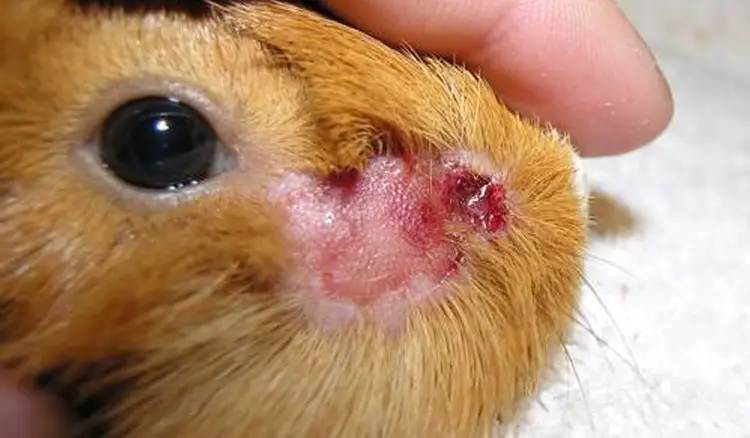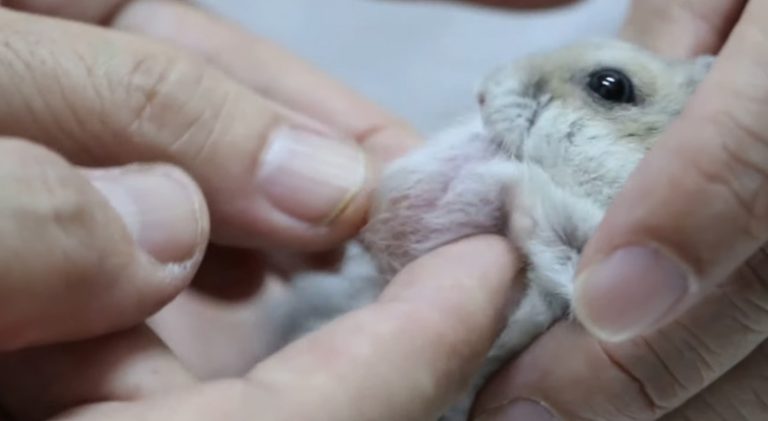Guinea pigs, those endearing small rodents known for their charming squeaks and playful antics, often capture our hearts as cherished companions. Yet, responsible pet ownership goes beyond cuddles and cute moments, it also involves safeguarding their health. When it comes to the well-being of these delightful creatures, understanding and addressing potential health issues is paramount. One such concern is abscesses, localized collections of pus typically caused by bacterial infections. So, can an abscess kill a guinea pig? In short, yes, it can if left untreated or unrecognized.
In this comprehensive guide, we will dive into the world of abscesses in guinea pigs, unraveling what they are, why they matter, and how you can effectively manage and prevent them. Join us on this journey to ensure the longevity and happiness of your beloved guinea pig companion.

What is an Abscess?
Abscesses are more than mere bumps they are pockets of infection that demand our attention. Commonly triggered by bacterial invasion, these pockets of pus can develop in various regions of a guinea pig’s body. A prominent cause is wounds that become infected, emphasizing the importance of a clean living environment. Guinea pigs are particularly prone to abscesses in areas like the neck, head, and behind the ears.
A critical aspect of recognizing abscesses is understanding the signs and symptoms. A vigilant owner may notice swelling, redness, or even discharge from the affected area. Behavioral changes such as lethargy or irritability may also signal an underlying issue. Knowing what to look for is the first step in providing timely care for your furry friend. Connecting with your guinea pig on a daily basis enables you to identify abnormalities swiftly, ensuring a rapid response to potential health concerns.
Why Abscesses Matter for Guinea Pigs?
Abscesses are not merely cosmetic concerns, they can have profound implications for a guinea pig’s health. If left untreated, these infections can escalate, leading to systemic issues and, in extreme cases, proving fatal. Guinea pigs have a delicate physiology, and abscesses can compromise their overall well-being. Moreover, the pain and discomfort associated with abscesses can adversely affect their quality of life. Recognizing the significance of abscesses emphasizes the need for proactive care and prompt veterinary attention.
Understanding the gravity of abscesses underscores the necessity of regular health check-ups for guinea pigs. Routine examinations by a qualified veterinarian can detect potential issues early, facilitating timely intervention. Guinea pig owners should be attuned to changes in behavior or appearance, as these subtle cues can be indicative of an underlying problem. It’s a proactive approach to pet care that can make a substantial difference in the life of your furry companion.
Recognizing Abscesses in Guinea Pigs
Identifying an abscess in your guinea pig requires a keen eye and a comprehensive understanding of their normal behavior and appearance. Visual cues include swelling, which may be subtle at first but can rapidly progress if left unattended. Redness and heat around the affected area are additional indicators of an ongoing infection. Your guinea pig’s behavior may also offer crucial insights, a normally active piggy may become lethargic, while a sociable one might display signs of irritability or withdrawal.
Timely intervention is key when dealing with abscesses. If you notice any of the aforementioned signs, it’s imperative to seek veterinary assistance promptly. Guinea pigs are resilient, but their small size and unique physiology make them susceptible to rapid health deterioration. A veterinarian will conduct a thorough examination, possibly including diagnostic tests, to determine the extent of the infection. Early detection enables more effective treatment, increasing the chances of a full recovery for your furry friend.
Treatment Options
Once an abscess is diagnosed, a multi-faceted treatment approach is typically employed. Veterinary intervention is crucial for accurate diagnosis and appropriate treatment planning. Drainage of the abscess is often necessary, allowing for the removal of pus and debris. This procedure is performed under sterile conditions to prevent further contamination. Cleaning the affected area is essential to minimize the risk of recurrence, and your veterinarian may prescribe topical treatments or antimicrobial solutions.
Antibiotics play a central role in treating abscesses by targeting the underlying bacterial infection. The specific antibiotic and duration of treatment will be determined by the veterinarian based on the type of bacteria involved. In some cases, particularly when the abscess is large or in a critical location, surgical intervention may be necessary. Surgery aims to remove the entire abscess, reducing the risk of recurrence and promoting faster healing.
It’s crucial to follow the veterinarian’s recommendations for post-treatment care diligently. This may involve administering prescribed medications, maintaining a clean living environment, and providing your guinea pig with extra care and attention during the recovery period. Regular follow-up appointments with the veterinarian will ensure that the abscess is healing as expected and that any necessary adjustments to the treatment plan can be made.
Preventing Abscesses in Guinea Pigs
Prevention is often more straightforward and less stressful than treatment. Implementing proactive measures in your guinea pig’s care routine can significantly reduce the risk of abscesses. The primary focus should be on maintaining a clean and hygienic living environment. Regularly clean your guinea pig’s cage, removing any soiled bedding or uneaten food promptly. Pay special attention to areas prone to abscesses, such as the neck and head, ensuring they are clean and dry.
In addition to cleanliness, a well-balanced diet contributes to overall health and immune system function. Providing your guinea pig with a diet rich in fresh hay, vegetables, and high-quality pellets supports their nutritional needs and helps bolster their immune system. Adequate hydration is also essential, make sure your guinea pig always has access to fresh, clean water.
Routine health check-ups are a proactive measure that can catch potential issues before they escalate. Establishing a relationship with a knowledgeable veterinarian who specializes in exotic pets, including guinea pigs, ensures that your furry friend receives the best possible care. Regular check-ups may involve a thorough examination, dental care, and discussions about preventive measures tailored to your guinea pig’s specific needs.
Pro Tip: Establish a Daily Bonding Routine
Beyond regular care, spending quality time with your guinea pig aids in early issue detection. During your bonding sessions, observe their behavior, check for any unusual lumps or bumps, and ensure they’re active and responsive. This daily interaction not only strengthens your bond but also enhances your ability to spot potential health concerns promptly. Early intervention can be key to maintaining your guinea pig’s well-being.
Tips for At-Home Care
While professional veterinary care is paramount, at-home care plays a crucial role in supporting your guinea pig’s recovery. After drainage and treatment by the veterinarian, your guinea pig may need additional care at home. Providing a comfortable and stress-free environment is essential during this period. Ensure that your guinea pig has a quiet and warm place to rest, away from drafts or sudden temperature changes.
Administering prescribed medications is a critical aspect of at-home care. Follow the veterinarian’s instructions carefully, including dosage and frequency. If your guinea pig is prescribed antibiotics, complete the entire course, even if the symptoms appear to have resolved. This helps prevent the development of antibiotic-resistant bacteria and ensures that the infection is fully eradicated.
Monitoring your guinea pig’s progress is essential. Keep a close eye on the treated area for any signs of recurrence or complications. If you notice any concerning changes, such as increased swelling, redness, or discharge, contact your veterinarian promptly. Regular follow-up appointments may be scheduled to track your guinea pig’s recovery and make any necessary adjustments to the treatment plan.
Case Studies and Success Stories
Real-life examples can provide valuable insights into the challenges and successes of managing abscesses in guinea pigs. Let’s explore a couple of case studies that highlight the importance of early intervention and comprehensive care.
Case Study 1: Rosie’s Road to Recovery
Rosie, a three-year-old guinea pig, developed a small abscess behind her left ear. Her vigilant owner, Sarah, noticed the swelling and promptly sought veterinary assistance. The veterinarian conducted a thorough examination, including drainage of the abscess and a course of antibiotics. Sarah diligently followed the prescribed at-home care routine, ensuring Rosie had a comfortable and clean environment.
Within a few weeks, Rosie showed signs of improvement. The swelling reduced, and she regained her normal energy levels. Regular follow-up appointments confirmed the successful resolution of the abscess. Rosie’s case underscores the importance of early detection, prompt veterinary care, and dedicated at-home care in achieving a positive outcome.
Case Study 2: Jasper’s Surgical Success
Jasper, a two-year-old guinea pig, presented with a large abscess on his neck. Due to its size and location, surgical intervention was deemed necessary. The experienced veterinarian performed a careful surgery to remove the entire abscess. Post-surgery, Jasper received a course of antibiotics and attentive at-home care.
Jasper’s recovery was gradual but steady. The surgical approach proved effective in preventing the recurrence of the abscess. Regular check-ups and ongoing communication between Jasper’s owner and the veterinarian ensured that any concerns were addressed promptly. Jasper’s case highlights the importance of tailored treatment plans and the collaboration between pet owners and veterinary professionals.
These case studies exemplify the resilience of guinea pigs and the positive outcomes achievable with timely and comprehensive care. Each guinea pig is unique, and their journey to recovery may vary, but these stories offer hope and encouragement for pet owners facing similar challenges.
End Note
Understanding and managing abscesses in guinea pigs is a critical aspect of responsible pet ownership. Vigilance, proactive care, and a strong partnership with a knowledgeable veterinarian are key elements in ensuring the well-being of these delightful rodents. From recognizing the signs of abscesses to implementing preventive measures, this comprehensive guide equips guinea pig owners with the knowledge and tools to provide optimal care.
As you embark on this journey of pet ownership, remember that each guinea pig is an individual with unique needs. Regular health check-ups, a clean living environment, and a nutritious diet are foundational elements of their care. By staying informed and attentive, you can create a loving and supportive environment for your guinea pig, promoting a happy and healthy life.
People Also Ask For
Can guinea pigs get abscesses from dental issues?
Dental problems, if not addressed, can lead to abscesses. Regular dental check-ups are crucial for preventing complications.
Is there a connection between diet and abscess formation?
While not directly causing abscesses, an improper diet may weaken the immune system, making guinea pigs more susceptible to infections.
Are there topical treatments available for abscesses?
Depending on the abscess’s location, some cases may benefit from topical treatments to complement systemic therapies and aid in healing.
Can guinea pigs with abscesses transmit infections to humans?
Generally, guinea pig abscesses are caused by bacteria specific to them. However, maintaining good hygiene is essential to prevent any potential zoonotic risks.
What signs suggest a guinea pig’s abscess is recurring?
If you observe persistent swelling, redness, or discharge after treatment, it could indicate a recurring abscess, warranting a prompt veterinary reevaluation.






![What Can Guinea Pigs Eat [A Pro Guide]](https://www.rodentsfamily.com/wp-content/uploads/2023/08/What-Can-Guinea-Pigs-Eat.jpg)
